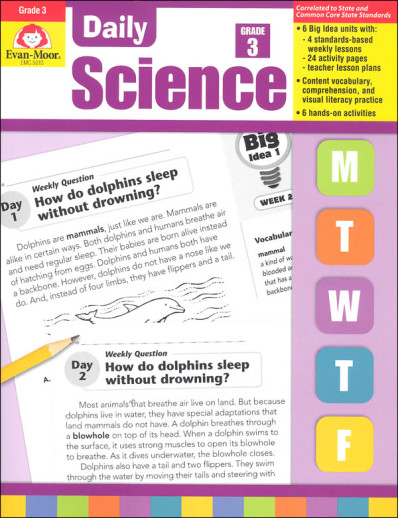We use cookies to make your experience better. To comply with the new e-Privacy directive, we need to ask for your consent to set the cookies. Learn more.
Daily Science Grade 3
The Grade Level Teacher Book provides Teacher pages, Student Activity pages that are reproducible (for one classroom), and an answer key. This course covers: adaptation, migration, plants and plant life cycle, earth formation and fossils, air and weather, and light.
Fit standards-based science instruction into your curriculum!
Help your grade 3 students develop a genuine understanding of standards-based scientific concepts and vocabulary using the 150 engaging activities in Daily Science! A variety of rich resources, including vocabulary practice, hands-on science activities, and comprehension tests in multiple-choice format, help you successfully introduce students to earth, life, and physical science concepts.
30 weeks of instruction cover the following standards-based science topics:
Big Idea 1: Living things have adaptations that help them survive in their environment.
Week 1: Why do flowers have different colors and scents?
Week 2: How do dolphins sleep without drowning?
Week 3: Why does a cactus have needles?
Week 4: Why do birds migrate?
Week 5: Unit Review
Big Idea 2: Plants have many parts. Each part does a special job.
Week 1: What's the difference between a fruit and a vegetable?
Week 2: How does a tree get water from its roots to its leaves?
Week 3: Why do dandelions turn white and fluffy?
Week 4: Why do leaves change color in the fall?
Week 5: Unit Review
Big Idea 3: Fossils tell us about the plants and animals that lived long ago.
Week 1: Where is the best place to look for fossils?
Week 2: How do scientists know how old a fossil is?
Week 3: Why are fossils of ocean animals found on mountains today?
Week 4: How does something become a fossil?
Week 5: Unit Review
Big Idea 4: Air is a gas that surrounds us, takes up space, and creates weather.
Week 1: Why can't you breathe in outer space?
Week 2: Why does a can of soda sometimes explode when you open it?
Week 3: Where does wind come from?
Week 4: How do birds fly?
Week 5: Unit Review
Big Idea 5: Light moves in a straight line until it hits an object. Light can be absorbed, refracted, or reflected.
Week 1: Why does it get hot in the car on a sunny day when it is cold outside?
Week 2: Why does a straw look bent in a glass of water?
Week 3: Why do things look backward in a mirror?
Week 4: How does a movie projector work?
Week 5: Unit Review
Big Idea 6: Electricity travels in currents. It can pull and push the things around it.
Week 1: Where does lightning come from?
Week 2: Why do people get a shock when they touch metal?
Week 3: How does a battery make electricity?
Week 4: How does flipping a switch make a light bulb light up?
Week 5: Unit Review
Providing daily supplemental activity pages for elementary to early middle school, this Evan-Moor series reinforces scientific knowledge, reading comprehension and vocabulary development. Short, 10-15-minute activities organized around reading passages are easy to implement and schedule into your educational day.
Organized into 6 topical Big Ideas Units each investigating a question from life, earth, or physical science and based on state standards. Each Unit is 5 weeks long, with Weeks 1-4 providing teaching on the key information. Weekly lessons begin with a Teacher Page that provides additional information and activity ideas. Student Activity pages follow. Days 1-4 include a variety of writing, comprehension, vocabulary, critical thinking, visual literacy, oral language practice or hands-on activities. Day 5 is review. Week 5 is considered a Unit review with comprehension questions, visual literacy activity, vocabulary review and a hands-on activity related to the previous 4 weeks. From a secular publisher, there is evolutionary content. ~ Deanne
The Grade Level Teacher Book provides Teacher pages, reproducible (for one classroom) Student Activity pages, and an answer key. 192 pgs. pb
The Student Practice Book (Student Workbook) provides only the Student Activity pages. This book is not reproducible and does not include the answer key. It is designed to be used with an additional student or instead of copying the Student pages from the Teacher book.
| Product Format: | Paperback |
|---|---|
| Brand: | Evan-Moor |
| Grade: | 3 |
| ISBN: | 9781596734210 |
| EAN/UPC: | 023472050137 |
| Length in Inches: | 10.875 |
| Width in Inches: | 8.5 |
| Height in Inches: | 0.5 |
| Weight in Pounds: | 1.2 |

